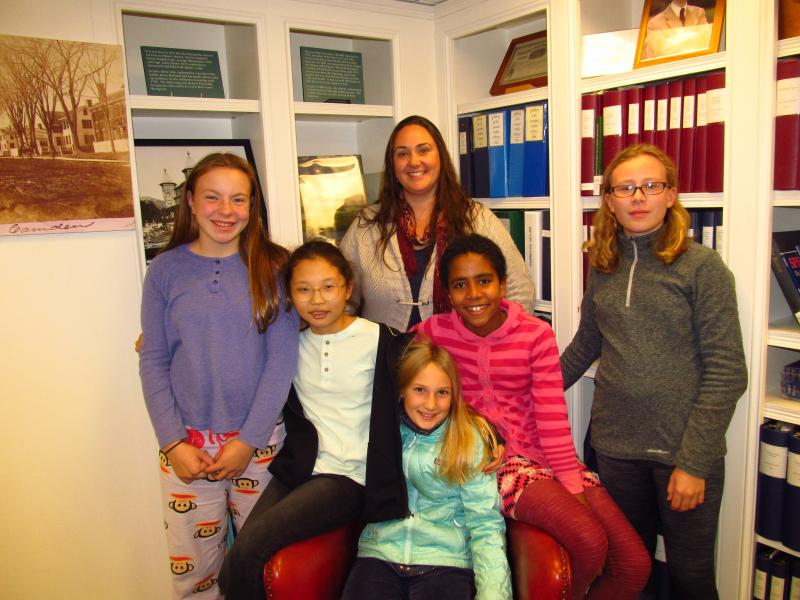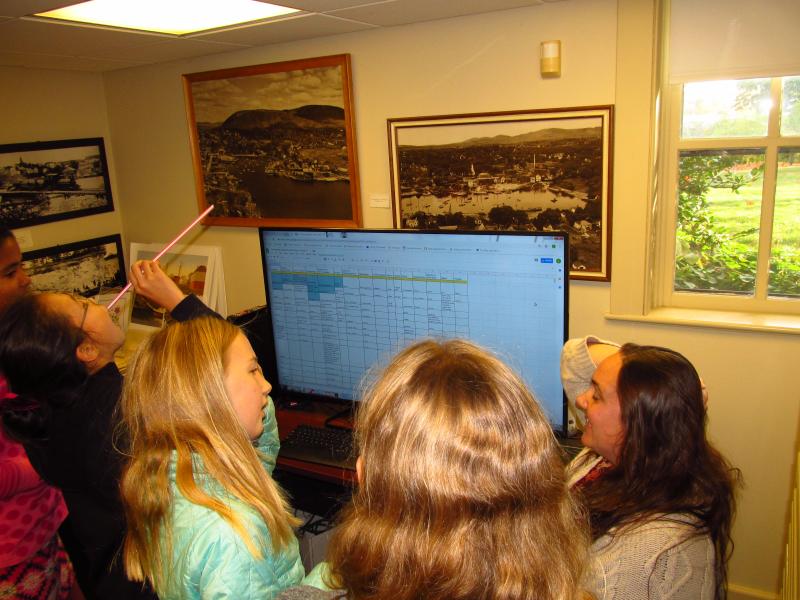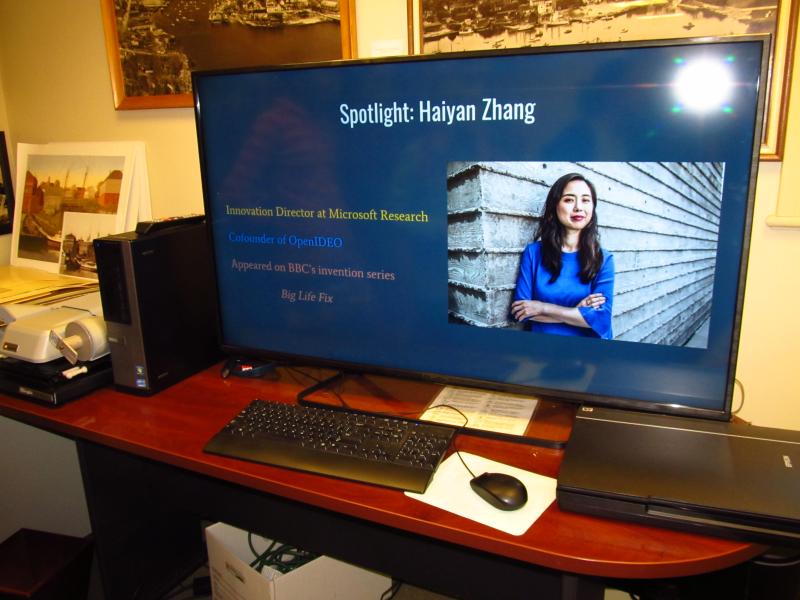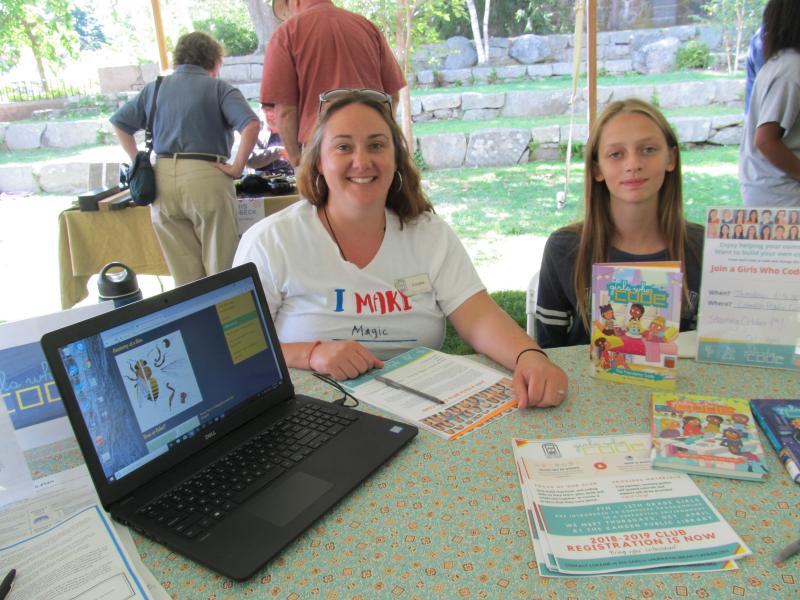Girls Who Code turns hobbies into computer science at Camden Public Library
 Back row: Eliza Nickelson, Club Coordinator Loraine Murray, Ava Mallow. Middle Row: Dana Lee and Sanbatè Doshi
Front Row: Tigger Hearst. (Photo by Kay Stephens)
Back row: Eliza Nickelson, Club Coordinator Loraine Murray, Ava Mallow. Middle Row: Dana Lee and Sanbatè Doshi
Front Row: Tigger Hearst. (Photo by Kay Stephens)
 Checking out the spreadsheet of topic ideas. )Photo by Kay Stephens)
Checking out the spreadsheet of topic ideas. )Photo by Kay Stephens)
 Last week’s spotlight was on Haiyan Zhang, innovation director at Microsoft Research. (Photo by Kay Stephens)
Last week’s spotlight was on Haiyan Zhang, innovation director at Microsoft Research. (Photo by Kay Stephens)
 Loraine Murray and Abby Harrison of Girls Who Code Club at Mini Maker Faire in September. (Photo by Kay Stephens)
Loraine Murray and Abby Harrison of Girls Who Code Club at Mini Maker Faire in September. (Photo by Kay Stephens)
 Back row: Eliza Nickelson, Club Coordinator Loraine Murray, Ava Mallow. Middle Row: Dana Lee and Sanbatè Doshi
Front Row: Tigger Hearst. (Photo by Kay Stephens)
Back row: Eliza Nickelson, Club Coordinator Loraine Murray, Ava Mallow. Middle Row: Dana Lee and Sanbatè Doshi
Front Row: Tigger Hearst. (Photo by Kay Stephens)
 Checking out the spreadsheet of topic ideas. )Photo by Kay Stephens)
Checking out the spreadsheet of topic ideas. )Photo by Kay Stephens)
 Last week’s spotlight was on Haiyan Zhang, innovation director at Microsoft Research. (Photo by Kay Stephens)
Last week’s spotlight was on Haiyan Zhang, innovation director at Microsoft Research. (Photo by Kay Stephens)
 Loraine Murray and Abby Harrison of Girls Who Code Club at Mini Maker Faire in September. (Photo by Kay Stephens)
Loraine Murray and Abby Harrison of Girls Who Code Club at Mini Maker Faire in September. (Photo by Kay Stephens)
CAMDEN — Every Thursday, up to 10 girls from sixth to 11th grade meet at the Camden Public Library in a club called Girls Who Code. The club, a local offshoot of a national network of the same name, “allows girls to join a safe, supportive environment of peers and role models to see themselves as computer scientists.”
Before the topic of coding gets underway, the girls first get a little distracted by candy, a favorite snack.
“But it’s not just about eating candy,” said sixth grader Dana Lee. “You can make a website about candy. You can make a game online about candy.”
Candy isn’t the only topic that the girls find interesting enough to create code around. (Although club coordinator Loraine Murray has learned that delaying gratification of snacks until they’ve gotten some club business done first helps with their attention span.)
In a spreadsheet Murray did based on all of their interests, the girls listed marine life, social justice, technology, sports an activities, music and activities, among other topics to delve into in the program.
“For our younger students, we’ve got interests around puppies, kittens, video games and boy bands, whereas our older high school students focus their time around social justice issues, sustainability and college debt,” said Murray.
The club is a hive of chatter where the girls feel free to say whatever is on their mind, joke around and talk about their daily lives. Then, Murray switches their focus to a female role model.
“Every week we have a slideshow and a YouTube video about an important woman in technology,” said Murray.
This past week, the spotlight was on Haiyan Zhang, the innovation director at Microsoft Research, who also appeared on BBC’s Invention Series, Big Life’s Fix.
“She invented a wearable watch that helps control tremors for sufferers of Parkinson’s Disease,” Murray told the girls. “She’s not just an inventor, but she’s done some really cool things that help other people.”
The club, which runs from October to April, allows the girls to collaboratively work on building a website from scratch.
“We just started the girls with basic coding last week,” said Murray. “We log into this platform called Scratch, a free online program from MIT, and the girls learn basic animation, some different vocabulary and coding techniques. Throughout the year, the girls will build upon their coding skills through Scratch and other programs, as well as work on a Community Impact Project. Thanks in large part to their sponsor Kepware, a software development company in Portland, Camden Public Library provides each girl with a laptop, so they get to work at their own pace.”
All of the girls have hobbies beyond computer science, which Murray taps into to keep the coding projects interesting.
This past September, during the Mini Maker Faire, Murray displayed a website designed by last year's Girls Who Code Club. Club member Abby Harrison, 13, was on-hand to talk about using the Jimdo platform.
“Abby and the other club members did a bunch of research on honeybee behavior, and the girls built the website, as well as also coded a couple of games within the website to play with,” said Murray.
“I came last year in the middle of last year and was the youngest and at the time, I didn’t really know a lot of coding,” said Dana Lee. “But this year, I can do a lot more and it’s fun to do computer coding here instead of being at home, doing homework.”
“I just like being around other girls like me,” echoed sixth grader Sanbatè Doshi.
“The thing I like about coding is that it’s all girls, and it’s fun and there are cookies,” said sixth grader Tigger Hearst.
So, yes, it’s back to cookies, but at least you can make a website about cookies. You can make an online game about cookies.
For more information visit: GirlsWhoCode
Kay Stephens can be reached at news@penbaypilot.com
Event Date
Address
United States




























